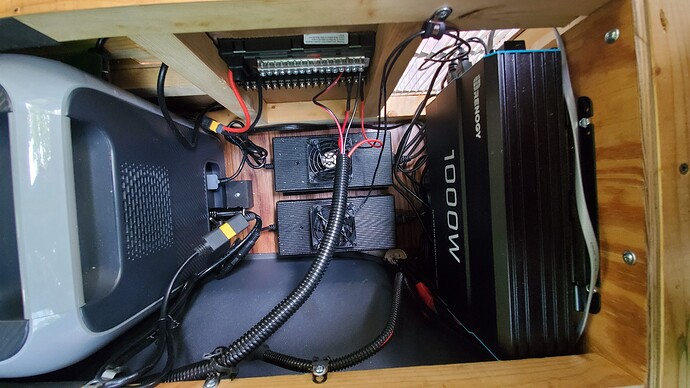I’ll be using EB70 for my camper van conversion. Is there a way to speed up car alternator charging? Perhaps using a 12v to 24v converter and wiring to the solar input? I have a 180A alternator.
Next question, can I use multiple dc outlets at the same time the (2- 10A and the ciggy plug)? Would like to hook up to a fuse block and power lights, fan, water pump, and a small 12v cooler. Thanks for any insights, I am an electrical noob.
You could do the dc to dc charging from your alternator or hook an AC inverter and use the ac charger. I have an Ac inverter in mine. If i ever take my bluetti out of my van i still have a way to power AC appliances
They do make cigarette plugs that go to fuse boxes or you can make your own. By cutting off the end of one and wiring it but make sure you use the proper gauge wire.
Thanks Wex, I’ve heard of using an inverter to charge before but I’m lost as to the appropriate size and how to hook up. Pure sine wave? DC to DC charger…how to wire it?
You would want to get a pure sine wave inverter that has a capacity of double the watts that would be consumed by the AC charger you would be using. You would connect the inverter directly to your vehicle battery.
Interesting… i have a 1000watt inverter with two 400watt chargers and it works well. I am new to electricity. What are the issues ill run into by not having am inverter with double the wattage?
Thanks…So if I understand what you are saying, the ac charger you refer to is a separate component and not the charger built in to the eb70?
No, the charger I am referring to is the AC charger that comes with the unit to charge from an AC power source. The main thing in my opinion is you don’t want to run any mechanical or electronic device at maximum for a long period of time. By nature of charging you will be subjecting that to running for an extended period of time. Just like if you were running a full out sprint you’re going to wear out much faster than if you were running at a slow jog. Therefore I would always cautiously recommend that you do not exceed 50% of a rated load on an item for an extended run time
Ok, I get it, thanks!
Wex…I like the idea of dc to dc charging from the alternator. I assume I would need a battery isolator device like the Stinger or similar so I would not drain my starter battery when the van is not running. Would this provide faster charging than just using the cigarette plug? Also, since the input for solar will accept 24 volt, could I get faster charging by adding a 24v converter to the system?
SB, I thank you for your input. So, if I were to use a 500w inverter (or larger?) inverter and connect it to my battery, appropriately fused, could I use a battery isolator to automatically switch the inverter off and on so it only drew power from the van battery when it was running? When the van is running and the inverter powering the charging brick I should get the same charge rate as plugging into any 110ac outlet, right? Thanks for your help!
As far as AC inverter size the power bricks do not surge much if at all when turning on. So if you have 400watt power bricks a 1000 watt inverter will be fine for two. Or a 500watt inverter for one.
They also have 500watt power bricks. So a 600watt inverter or greater will work for one. Or a 1200watt inverter for 2.
I have a 150amp alternator and i can not run my air conditioner with two 400watt (800watts) going or my 70amp breaker will flip. So that should give you an estimate of what you want to set up.
You could go DC to Dc with something from renogy and put up to 700watts in your AC200 PV (Solar) port. It will have to convert 12volts to at least 36 volts to 120)
The AC max and new ones can accept more but check your alternator size. Also those devices usually are able to be set to shut off at a certain voltage as well. The renogy ac inverter i have came with a switch and I wired it to my dash.
Size your breaker appropriately too. I got most of my set up from lightharvestsolar.com
Yes, you could use an isolator. You can charge off of your battery for a time as well without the engine running without a need for an isolator at all. All depends on how long you would be charging withouth the engine running.
In my experience the most stressful aspect of designing a system to charge my AC200P from a vehicle has been deciding how much load I am willing to add to my vehicle’s alternator.
I can of course measure the total alternator current under various operating conditions, and can look up the “rated current” of my alternator. However, many online sources assert that vehicle alternator ratings refer to peak (i.e. short duration) loads, NOT continuous loads.
Lots of people assert opinions about the appropriate derating from published rating to continuous load rating, but I have never seen data to back up those opinions.
Since alternators don’t have temperature sensors, we end up guessing how much load is too much. I hope my guess is correct.
Personally, I would use a 50% capacity rule. I would not run my alternator for extended periods at more than 50% of its rated capacity
Another possible approach to estimating a continuous load that is “safe” for the alternator is to try to imagine the set of continuous loads that the designers of the vehicle would have assumed when they chose the alternator.
Some loads would pretty clearly be classified as “continuous” by the designers, e.g. engine electronics, electric radiator fan, headlights, aircon with max blower speed, sound system, cigarette lighter sockets (for charging phones).
However, some of the largest loads (e.g. window defogger, seat heaters) are often on timers, and it’s possible that the vehicle might not support the continuous operation of all those loads at the same time.
In the end, by attempt to guess the continuous design load for my vehicle was inconclusive.
I recently had to replace the alternator in my toyota camry. In the box the replacement “rebuilt” alternator came in was a slip of paper showing the test results for the alternator. The results showed the alternator produced almost twice the rated amps that the mfg. stated so I think they under rate them to a degree. Running long term at high load is my concern with the accompanying heat
“Ciggies” are rarely (or never?) wired with sufficient AWG (thickness) to power much for long. (Rewire if possible).
That bench test might have eluded any loss at the field charge or loss at the converter/rectifier?
Thank you all for the good advice. I think I have worked out a system that will work for me. I’ll know more when everything is implemented and we have done a test trip. One last question for now, not necessarily related to my initial query …Have you all had any satisfaction from Bluetti support? I have tried calling the support number several times and only gotten a message that “we are not accepting calls at this time, please try again later”. This is worrisome and not acceptable. I did manage to get an answer when I called Sales. I guess they are eager to sell something but not to help a customer post sale.
@furnitureguy they just got done having a weeklong vacation/holiday overseas but are back in the office now… did you try one of these contacts??

